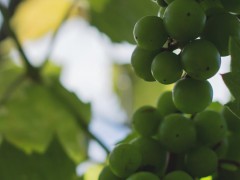Real changes in the food system will require a systemic realignment of agricultural producers and the food processors who can place big orders for inputs. Though direct market sales offer a farmer the plumpest margin, nothing can beat the dependable revenue of large wholesale orders to secure a base of income. Regional food processors are just now starting this long process of realignment by forming economic ties with local farmers, and they love to brag about just how good their sources are.
In no particular order, here are some innovative food entrepreneurs building their businesses in partnership with regional farmers that we are keeping an eye on in 2012.
1. Caledonia Spirits. Caledonia creates artisanal alcoholic beverages using local ingredients like honey, corn, elderberry, and barley. To secure access to these raw materials, Caledonia uses contracts and other legal agreements to create ties of dependency with its regional producers. Input sources are reflected on the label of each individual product, as well as on the company’s website. The admirable production ethos of Caledonia is aptly summed-up by the company’s Mission Statement:
The purpose of Caledonia Spirits is to add value to the work of the people of Vermont, including those growing grains, herbs, medicinal plants, and honey; to support and encourage the organic production of plants and honey in Vermont and surrounding regions; to provide employment and contribute to the health, spiritual, economic and social well being of the community, and to honor the traditions of Vermont, Scotland, France, Quebec and other agricultural communities that inspire our formulations.
We particularly love that Caledonia’s mission statement includes a reference to added-value, which is ag-geek for artisanal processing. Value-added activity helps support the price of raw agricultural products like honey and barley by refining them into attractive, delicious, high-value products like alcohol. Booze is one of the classic value-added products, right up there with charcuterie and cheese. A world-class cheese, a famous whiskey, or a desirable ham all have the potential to command a sale price far above their costs of production if they inspire enough rabid demand. It would be wonderful to see Calendonia reach these stratospheric heights of consumer esteem in the coming years. Given Caledonia’s commendable production ethos, we are sure its agricultural producers would reap their fair share of the compensation in the event its spirits gain reknown. The mutually beneficial financial and legal ties have limitless potential to return value for all involved as the reputation of Caledonia grows.
2. Brooklyn Bouillon: It takes talent to refine great raw materials into a superior artisanal product. Creating a superb product from waste however, is the near-miraculous apotheosis of value-added agriculture. Founder of Brooklyn Bouillon, Rachael Mamane, takes chicken bones, feet, and other assorted nasty bits from local farms, then morphs them into refined, beautifully packaged, professional grade chicken stock. Of course, all product inputs come from the sturdy, nutrient-rich bones of pastured chickens, which are raised within the upstate region of New York.
Rachael takes the concept of partnering with local input producers to its fanatical conclusion. Stocks are made in distinct batches using ingredients from a single contributing farm, just like single-malt scotch. The company profits in one of two ways. Using the traditional route, Brooklyn pays the farmer cash for the inputs, then prepares the stock for its own direct-market and wholesale distribution.
Alternatively, farmers can also elect to have Brooklyn refine their bones and bits for them, then ship them back to the farm. Farmers then sell the stock, made with the inputs from their own farm, at markets or on the roadside. They then split the profits with Rachael.
Using either method, the identity of the farm goes right onto the front of the label, so both Brooklyn Bouillon and the farm share the credit for the product, which is just as important to the business as product revenue.
3. Two Guys In Vermont: Not only has this innovative soup company purchased nearly 8,000 pounds of vegetables from 9 local farms in the last year, they have been savvy enough to brag about it in their marketing materials. That’s 4 tons worth of value that stayed within the New England community. Like the other businesses on this list, Two Guys promotes these farmers throughout their website and marketing materials. Recipes are tailored to promote the agricultural products which grow best in Vermont, like apples, butternut squash, sweet potato, carrots and fennel, and cream (dairy is used in their Garden Tomato Soup). Two Guys does most of their cooking during harvest season, but they are able to extend the season by fresh-freezing some ingredients, like butternut squash, that hold their flavor very well during the freeze. That way they can make locally grown soups throughout the year. The Guys mission goes like this:
Two Guys in Vermont prepares delicious foods using natural ingredients and continuously seeks regional farm food supply sources. We are committed to reducing personal exposures to pesticide and herbicide residues, not using GMO’s in our foods and using safe food packaging options. We aspire to participate in an emerging regional food supply chain that supports family-scale size farms and preserves their communities.
Two Guys guarantees this high standard by hand selecting both their farmers and their ingredients.
4. Saucy By Nature. Saucy is a Brooklyn-based producer of pre-made sauces. Saucy hand-selects fresh products like beets, onions, horseradish, mushrooms, apple cider, cider, pears, cranberries, sauerkraut, tomatoes, garlic, cilantro, jalapenos and various herbs like rosemary and mint. These comprise about 90% of the ingredients that go into each sauce come from local farms.
Saucy is in the boost-phase right now, but have already made some ambitious plans to begin forward-contracting with farmers to provide ingredients for next season. Forward contracting for agricultural products means that they are grown-to-order, cash up-front. For a farmer, this is the sweetest form of revenue there is, and it is an excellent way for a processor to control costs.
5. Mountain Sweet Berry Farm Potato Chips. Mountain Sweet is run by the exceptionally talented Rick Bishop, Cornell grad and absolute soil savant. His latest mad-scientist creation is a new twist on the potato chip. Rick’s special talent is rare potato cultivars. He grows some 40 different varieties on his land in Roscoe, New York. Each of these potatoes have an incredibly distinctive taste when fried. No additives or flavorful powdered stuff comes anywhere near these chips and yet they have totally different flavors and textures. Rick’s embryonic venture has already created wealth in the tiny town of Roscoe, New York. Rick has already employed at least a chef and an assistant full-time in his operation, he has rented an underutilized production facility in which he makes his product, and he draws the urban dollars of New York City greenmarkets to his tiny hamlet every time he makes a direct market sale.
By some incredible stroke of good fortune, we were present when the first test-batch came out of the oil. Though we are reluctant to do product endorsements and turn the LLC into another foodie blog, we have to say these chips were astonishingly distinctive. Rick is so hardcore he doesn’t need a website to sell out of his product, otherwise we would certainly provide the link. Look for him at the Union Square Greenmarket and grab every last bag of his chips you can carry.
Transparency is the core concept shared by every one of these food innovators. Traceability is a natural result of their transparency. Each producer on this list vouches for the quality of their sources, and they do so right on the label. The distinctiveness of each refined product is completely dependent upon the skill of the farmer who grew the ingredient. The farmer is not an anonymous producer of bulk material but instead takes center stage with the processor. Consumers are starting to demand precisely this kind of accountability in their food, and it is gratifying to see the free market respond so adeptly to the needs of conscientious eaters.
Food entrepreneurs will be the primary agents of change. There will be no Happy Meal Ban to convert the masses at a single stroke to wholesome food. The next Farm Bill will be commodity centric just like every one of its predecessors. Advocates for convulsive change always come up against vested interest, and small producers do not have the bank accounts for attrition warfare.
Change will instead be haphazard but purposeful, plodding but elegantly economical, and almost imperceptible unless the new business models are carefully scrutinized. Our guess is that change will look a lot like the ties being made by the businesses on this list – a network of boring legal and financial relationships that create mutual dependencies between talented farmers and ingenious processors who create refined products that people will spend lots of money in order to consume.
Analyzing these relationships is not about fetishizing food or glorifying pastoralism. It’s just how business should be conducted. Consistent, contractually enforced orders going back and forth between farmers and processors are the basis for credit transactions to capitalize expansion for both groups. Local banks are more willing to lend to a farmer with a stack of open orders in her hand. The same banks would also be more willing to finance additional processing capacity for the food entrepreneur with a hot product, a loyal following, and a rapidly growing market share. Capital investment is the ultimate signifier and guarantor of stability and permanence.
Legal and business relationships justify investment in alternative agriculture and small-scale processing infrastructure. Change in the food system will achieve permanence only with a constellation of dreary and all-important legal and financial ties that bind together producers who grow fantastic, original raw materials and the processors who have the knowledge and resources to turn them into charged-up products consumers will throw their money at. The entrepreneurs on this list are the real vanguards of change. Reward their risk – buy local, and buy locally processed.
**Hat-tip to my buddy Taylor Cocalis of Good Food Jobs for suggesting the pioneers on the list.**
















